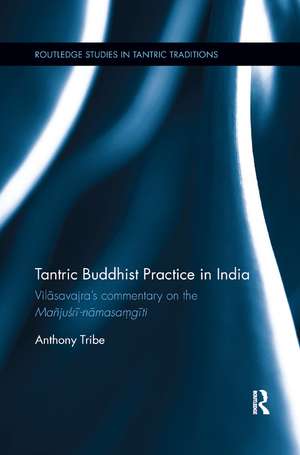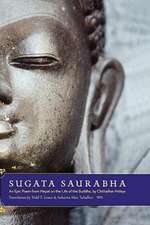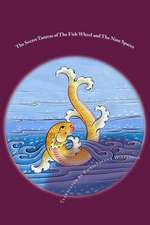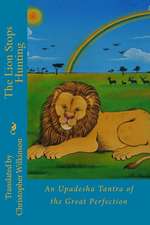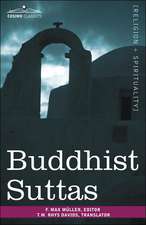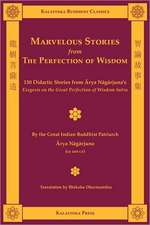Tantric Buddhist Practice in India: Vilāsavajra’s commentary on the Mañjuśrī-nāmasaṃgīti: Routledge Studies in Tantric Traditions
Autor Anthony Tribeen Limba Engleză Paperback – 12 dec 2019
The commentary interprets its root text within an elaborate framework of tantric visualisation and meditation that is based on an expanded form of the Buddhist Yoga Tantra mandala, the Vajradhātu-maṇḍala. At its heart is the figure of Mañjuśrī, no longer the familiar bodhisattva of wisdom, but now the embodiment of the awakened non-dual gnosis that underlies all Buddhas as well their activity in the cosmos.
The book contributes to our understanding of the history of Indian tantric Buddhism in a period of significant change and innovation. With its extensively annotated translation and lengthy introductions the book is designed to appeal not only to professional scholars and research students but also to contemporary Buddhists.
| Toate formatele și edițiile | Preț | Express |
|---|---|---|
| Paperback (1) | 403.80 lei 6-8 săpt. | |
| Taylor & Francis – 12 dec 2019 | 403.80 lei 6-8 săpt. | |
| Hardback (1) | 1064.98 lei 6-8 săpt. | |
| Taylor & Francis – 3 iun 2016 | 1064.98 lei 6-8 săpt. |
Din seria Routledge Studies in Tantric Traditions
-
 Preț: 422.71 lei
Preț: 422.71 lei -
 Preț: 310.14 lei
Preț: 310.14 lei -
 Preț: 494.22 lei
Preț: 494.22 lei -
 Preț: 378.43 lei
Preț: 378.43 lei -
 Preț: 408.74 lei
Preț: 408.74 lei -
 Preț: 462.60 lei
Preț: 462.60 lei -
 Preț: 469.34 lei
Preț: 469.34 lei -
 Preț: 449.41 lei
Preț: 449.41 lei - 19%
 Preț: 257.03 lei
Preț: 257.03 lei
Preț: 403.80 lei
Nou
Puncte Express: 606
Preț estimativ în valută:
77.28€ • 83.91$ • 64.91£
77.28€ • 83.91$ • 64.91£
Carte tipărită la comandă
Livrare economică 23 aprilie-07 mai
Preluare comenzi: 021 569.72.76
Specificații
ISBN-13: 9780367877071
ISBN-10: 0367877074
Pagini: 432
Dimensiuni: 156 x 234 x 23 mm
Greutate: 0.63 kg
Ediția:1Adnotată
Editura: Taylor & Francis
Colecția Routledge
Seria Routledge Studies in Tantric Traditions
Locul publicării:Oxford, United Kingdom
ISBN-10: 0367877074
Pagini: 432
Dimensiuni: 156 x 234 x 23 mm
Greutate: 0.63 kg
Ediția:1Adnotată
Editura: Taylor & Francis
Colecția Routledge
Seria Routledge Studies in Tantric Traditions
Locul publicării:Oxford, United Kingdom
Public țintă
PostgraduateCuprins
Part 1: Introductions
Overview
1. Contexts
2. Vilâsavajra: locating the NMAA’s author
3. The Nâmasaṃgîti
4. Vilâsavajra’s NMAA: overviews and remarks
5. The NMAA’s maṇḍala in Himalayan Art
Part 2: Vilâsavajra’s Nâmamantrârthâvalokinî:
an annotated translation of chapters 1–5
Conventions in the translation
Chapter 1: On ‘The Request for Instruction’
Chapter 2: On ‘The Reply’
Chapter 3: On ‘The Survey of the Six Families’
Chapter 4: On ‘The Method of Awakening According to the Mâyâjâla’
Chapter 5: On ‘The Vajradhâtu-Mahâmaṇḍala of Bodhicittavajra’ Part III: Sanskrit Edition
Materials and Methods
1. Sigla
2. Manuscripts
3. Method of Editing
4. Stemma Codicum
5. The Tibetan Translation of the NMAA
Critical Edition of Vilâsavajra’s Nâmamantrârthâvalokinî:
Chapters 1–5
Adhikâra 1
Adhikâra 2
Adhikâra 3
Adhikâra 4
Adhikâra 5
Textual notes
Insignificant variants
Textual collation to establish the stemma codicum Appendices
Appendix 1. Works and authors cited in the NMAA
Appendix 2. Saṃvara, Cakrasaṃvara and Ṣaṭprajñânaya-
saṃvara citations
Appendix 3. NMAA colophons
Appendix 4. NMAA manuscripts:
Overview
1. Contexts
2. Vilâsavajra: locating the NMAA’s author
3. The Nâmasaṃgîti
4. Vilâsavajra’s NMAA: overviews and remarks
5. The NMAA’s maṇḍala in Himalayan Art
Part 2: Vilâsavajra’s Nâmamantrârthâvalokinî:
an annotated translation of chapters 1–5
Conventions in the translation
Chapter 1: On ‘The Request for Instruction’
Chapter 2: On ‘The Reply’
Chapter 3: On ‘The Survey of the Six Families’
Chapter 4: On ‘The Method of Awakening According to the Mâyâjâla’
Chapter 5: On ‘The Vajradhâtu-Mahâmaṇḍala of Bodhicittavajra’ Part III: Sanskrit Edition
Materials and Methods
1. Sigla
2. Manuscripts
3. Method of Editing
4. Stemma Codicum
5. The Tibetan Translation of the NMAA
Critical Edition of Vilâsavajra’s Nâmamantrârthâvalokinî:
Chapters 1–5
Adhikâra 1
Adhikâra 2
Adhikâra 3
Adhikâra 4
Adhikâra 5
Textual notes
Insignificant variants
Textual collation to establish the stemma codicum Appendices
Appendix 1. Works and authors cited in the NMAA
Appendix 2. Saṃvara, Cakrasaṃvara and Ṣaṭprajñânaya-
saṃvara citations
Appendix 3. NMAA colophons
Appendix 4. NMAA manuscripts:
Notă biografică
Anthony Tribe is an independent scholar with a research specialization in the history and development of tantric Buddhism in India. He is the co-author of Buddhist Thought: A Complete Introduction to the Indian Tradition (2012), also published by Routledge.
Descriere
Using a commentary on the influential text, the Mañjuśrī-nāmasaṃgīti, ‘The Chanting of the Names of Mañjuśrī’, this book deals with Buddhist tantric meditation practice and its doctrinal context in early-medieval India. The commentary was written by the 8th-9th century Indian tantric scholar Vilāsavajra, and the book contains a translation of th
